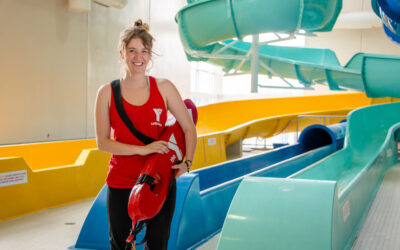“Engineering is all about solving problems and helping communities,” says UBC’s Sheryl Staub-French.
Photo: Martin Dee.
March 8 marks International Women’s Day. Annually, thousands of events are held throughout the world to inspire women and celebrate achievements.
“International Women’s Day is a great opportunity to celebrate the many career options available to women,” says BC Minister of Jobs, Tourism and Skills Training and Minister Responsible for Labour Shirley Bond. “Doors are opening in every sector of our economy, and the increasing number of women in British Columbia who are launching careers in the skilled trades is a sign of this progress.”
Bond references that opportunities are on the rise for women who want to pursue careers as plumbers, electricians, sheet-metal workers or other skilled trades. Since 2009, the percentage of women apprentices in B.C. has risen from 8.5% to 10.3%, with even bigger increases in trades such as welding and heavy equipment operation.
To date, the Women in Trades Training has successfully linked over 2,500 women throughout B.C. to training in the skilled trades, as well as to vital financial assistance for things like tools, textbooks, equipment and child care while they complete their education.
UBC turned the focus on the need for more women in engineering.
“Nationally, less than 20 per cent of students in university engineering programs are women,” says Sheryl Staub-French, an associate professor in UBC’s Dept. of Civil Engineering. “If a significant part of the talent pool isn’t even considering it as a career, you’re missing out on some of the best and brightest. And we’re facing some real labour shortages. Engineers Canada predicts a skill shortage of almost 100,000 engineers by 2020. Part of our work is to help address that skills gap by encouraging young women to explore career possibilities in engineering and science.”
Staub-French stressed that from a business perspective, good diversity tends to relate to better outcomes, such as increased innovation and profitability.
“Only 11 per cent of registered professional engineers are women, ” says Staub-French. “As a mom, it is also frustrating to think that my daughter will receive less encouragement to pursue engineering as a career than my son. Engineering is an excellent career – rewarding, creative, stable and well-paid – and I want my daughter to have the same opportunities as my son.”
In 2012, the national average enrollment of women in engineering programs was 18 per cent. Currently, 20 per cent of undergraduate engineering students at UBC are women. Some programs such as Environmental Engineering and Chemical Engineering have higher ratios of 44 and 34 per cent respectively.
Ratios are slightly higher for graduate studies in UBC Engineering, with 24 per cent of post-graduate degrees awarded to women. Within faculty ranks, 13 per cent of tenured or tenure-track faculty are women with a national average of 12.
The UBC Faculty of Applied Science aims to boost the number of women enrolled in its engineering programs by 50 per cent in five years. A $500,000 gift from Goldcorp will be used to establish the Goldcorp Professorship in Women in Engineering at UBC, a professorship that focuses on promoting engineering as a creative and rewarding career.
In Kelowna, Okanagan College will mark the day with an International Women’s Day event the evening of March 8.
[fbcomments]





0 Comments